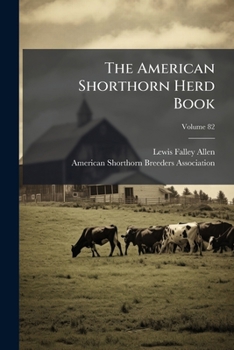The American Shorthorn Herd Book; Volume 82
The American Shorthorn Herd Book, Volume 82, compiled by Lewis Falley Allen and the American Shorthorn Breeders Association, stands as a comprehensive record of Shorthorn cattle lineage and breeding. This meticulously documented volume offers invaluable insights into the breed's development and the dedicated efforts of breeders to refine and improve Shorthorn characteristics.
Detailing the pedigrees, breeding histories, and notable traits of individual animals, this volume serves as an essential resource for historians, agricultural scholars, and anyone with an interest in animal husbandry and the evolution of livestock breeds in America. The book provides a unique glimpse into the practices and priorities of Shorthorn breeders during the period, reflecting the economic and agricultural landscape of the time. Preserving a vital piece of agricultural history, The American Shorthorn Herd Book remains a significant contribution to the understanding of animal science and the legacy of Shorthorn cattle in the United States.
This work has been selected by scholars as being culturally important, and is part of the knowledge base of civilization as we know it. This work was reproduced from the original artifact, and remains as true to the original work as possible. Therefore, you will see the original copyright references, library stamps (as most of these works have been housed in our most important libraries around the world), and other notations in the work.
This work is in the public domain in the United States of America, and possibly other nations. Within the United States, you may freely copy and distribute this work, as no entity (individual or corporate) has a copyright on the body of the work.
As a reproduction of a historical artifact, this work may contain missing or blurred pages, poor pictures, errant marks, etc. Scholars believe, and we concur, that this work is important enough to be preserved, reproduced, and made generally available to the public. We appreciate your support of the preservation process, and thank you for being an important part of keeping this knowledge alive and relevant.
Related Subjects
Engineering History Science Science & Math Science & Scientists Science & Technology Technology




